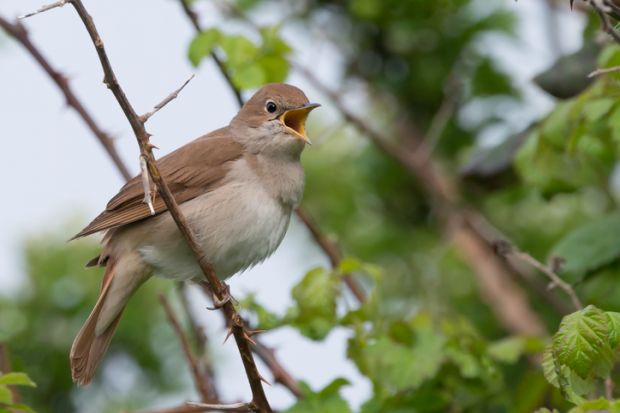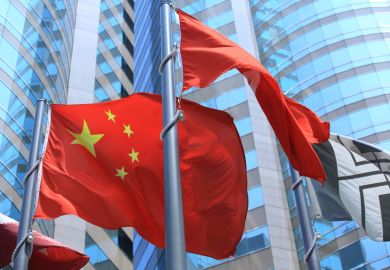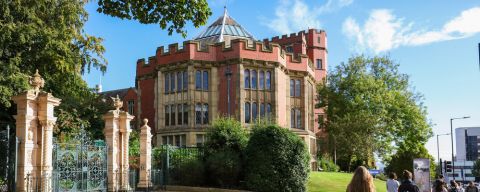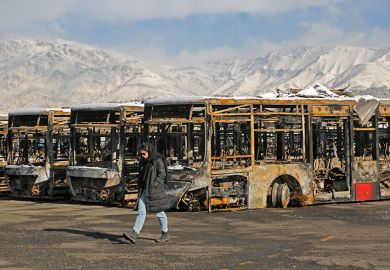Earlier this month, I was at a meeting in the contemporary palace that is the Museum of Science and Technology in Shanghai. I was representing the Royal Society’s president, Sir Venki Ramakrishnan, and we were discussing how China and the UK could work together in science and technology.
During my visit, I attended a Fudan University conference to discuss the future of the Chinese-British relationship in the new world of Brexit, Trump and nationalism.
China is thinking hard about its universities and their future, and looking to us for insight. Sitting at lunch with the university’s chancellor, Jiao Yang, we talked about how we should develop our communities to produce the scholarship and innovation that our countries so desperately need.
I was struck by our common problems in making our nations both prosperous and harmonious. How can we do that? Well, that is the challenge: how can we serve the people who rely on us to innovate and deliver prosperity, who in the end pay our salaries as scientists and researchers?
The chancellor was a thoughtful woman, keen to know about our own experience. But I had a particular concern that I voiced at the lunch. Now is not a time for us to claim that we have answers for others when we are struggling to define our own future.
Beyond the tree-lined campus and college bookshops of Fudan lies another China, one of the world’s great developing nations, with a proud history and surely an influential future. But its people are hungry for growth, prosperity and an end to the severe inequalities that still define this land. With growing debt and rising nationalism a familiar story around the world, elites are facing accusations of isolation.
What is our relevance, as universities, beyond our own environs?
We have our academic voyages of discovery. But how do we honour and support those who leave the ivory tower and work directly with the industrial community, as surely they should? How can we reward and not lose sight of those who go beyond our known world into uncharted territory, and who exercise their scholarship in the realities of the cities and factories where most live and work?
It reminds me of the story of the emperor and the nightingale. This allegory describes the ability to perceive the difference between a highly sophisticated mechanical model of a nightingale, and a real singing, flying bird.
The mechanical version is admired in the court of the emperor for its own version of beauty and complexity. And then the awful truth. Only the emperor can see, hear and truly appreciate the real nightingale. Many have become so far removed from the forest that they prefer the predictable clockwork songstress.
Absurd? Unbelievable? I think not.
It seems to me that we risk becoming like those people who lost the ability to see what a real bird in the real world is. We are too often like the emperor’s subjects, looking at a mechanical vision of academia and seeing it in the cold, mechanical and conventional ways we think about “excellence”. We measure a community of scholars in forms of published papers and league tables.
Why is this such a big deal? It is because we are just building a more refined mechanism, and an essentially false version of life.
In the story, the nightingale asks the emperor – who wants to reward the living bird’s authentic song – only for her liberty. To be free to fly from the cloistered world of the porcelain palace and out in the open air of the forest. And as we build more and more perfect mechanical universities, the result is something less and less able to fly into the real world and sing its song to the people.
I am not alone in this fear, and not the first to write about it.
My predecessor at the University of Sheffield, Sir Gareth Roberts, an academic and industrial scientist, understood this well. And there are many wonderful scholars who long to break free of the palace confines and go over the wall – not just medics and engineers, as you might expect, but also our arts and humanities scholars, our lawyers and others.
We are imperilling true relevance and impact in the world if we do not shake ourselves and think what our worship of league tables – now increasingly exported to China and further afield – is for.
We are too often lost in the pursuit of glory. We are vulnerable to a kind of “Science Olympics”, in which the first past the tape wins in every sense, and there is a medals table to boot. But the runner who sees an injured child at the side of the track and stops to pick him up has lost.
As China pushes its universities to move up the league tables, what will they measure? What will serve their own people? In our preoccupation with an idea of perfection built on a historic model, will we and they fail in our true mission – to serve the people?
My university has as part of its founding mission statement: “The University shall be for the people.” It was first written on a poster to raise funds for our institution that was displayed in factories around our city, generating penny donations from workers who believed in the possibility of education.
Yet to serve the people has many facets. It depends on the students and what they need to flourish. It depends on myriad issues that cannot be captured by simple metrics. It may involve us going off-piste – doing what needs to be done simply because we see the possibility and are unafraid to follow where our scholarship leads, working as we do with partners who are unexpected, unconventional.
However much we struggle to perfect our excellence frameworks or metrics, we are always in danger of perfecting the mechanical model and ignoring real life. To my mind, academic freedom is the freedom to do what is needed as a scholar in response to the needs of the world around me. Every time another target and league table is brought in, it stops me from being free. I am a serf to the central plan of the ideal society.
So let’s try to free the nightingale. Let’s try to let academics be free to respond to the depths of scholarship and the wider needs of society.
Sir Keith Burnett is vice-chancellor of the University of Sheffield.
Register to continue
Why register?
- Registration is free and only takes a moment
- Once registered, you can read 3 articles a month
- Sign up for our newsletter
Subscribe
Or subscribe for unlimited access to:
- Unlimited access to news, views, insights & reviews
- Digital editions
- Digital access to THE’s university and college rankings analysis
Already registered or a current subscriber?









